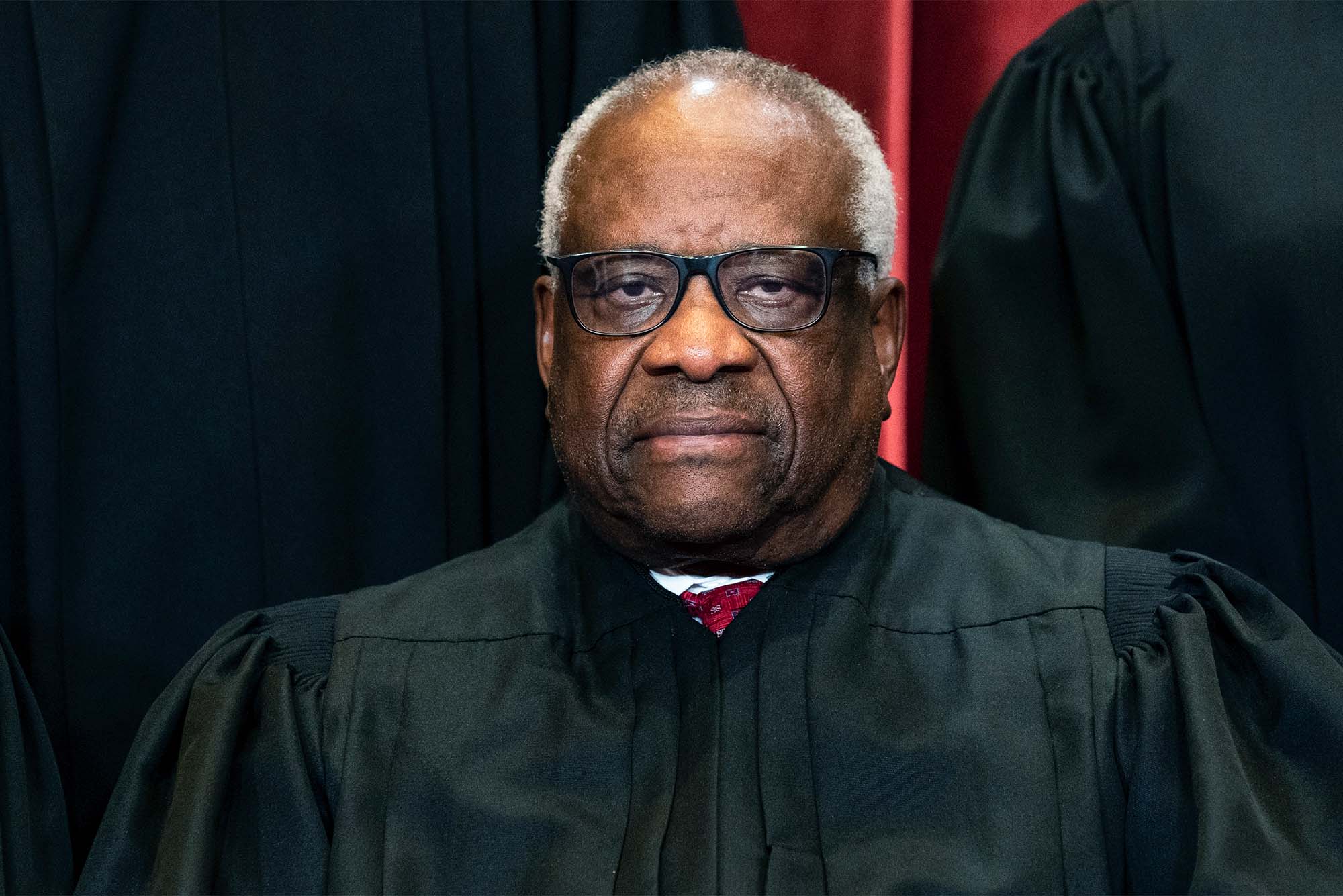Court Upholds Gun Ban for Those Accused of Domestic Violence; BU LAW Expert Explains
Michael Ulrich says despite the 8-1 ruling, the Supreme Court’s conservative justices do not agree on what “originalism” means

Only Justice Clarence Thomas dissented from the Supreme Court’s upholding a ban on gun ownership by domestic abusers. Photo by J. Scott Applewhite via AP
Court Upholds Gun Ban for Those Accused of Domestic Violence; BU LAW Expert Explains
Michael Ulrich says despite the 8-1 ruling, the Supreme Court’s conservative justices do not agree on what “originalism” means
The US Supreme Court has upheld a federal ban on gun ownership by people under domestic violence restraining orders, a sound decision that nevertheless leaves murky which gun restrictions the court will leave intact in the future, Boston University legal scholar Michael Ulrich says.
Writing on Friday for the court’s 8-1 majority in United States v. Rahimi, Chief Justice John Roberts held: “Since the founding, our nation’s firearm laws have included provisions preventing individuals who threaten physical harm to others from misusing firearms.”

In recent years, some lower courts have struck down federal bans on gun ownership for convicted felons or those using drugs, relying on the high court’s 2022 ruling in New York State Rifle & Pistol Association v. Bruen. That ruling disallowed some New York limits on gun-carrying on grounds that they broke with the Second Amendment’s “historical tradition.” But Roberts wrote that those lower courts “have misunderstood the methodology of our recent Second Amendment cases. These precedents were not meant to suggest a law trapped in amber,” under which the Amendment’s right to bear arms would only apply to “muskets and sabers.”
Six other justices wrote or joined concurring opinions; only the conservative Justice Clarence Thomas dissented. “Not a single historical regulation justifies the statute at issue,” Thomas wrote of the ruling. His words highlight an evolving schism with fellow conservative Amy Coney Barrett, who has criticized his “laser-like focus on the history” that “misses the forest for the trees.”
Her concurring opinion Friday said, “The Second Amendment is not absolute. It codified a preexisting right, and preexisting limits on that right are part and parcel of it.” Their disagreement matters because the court’s conservative majority embraces “originalism,” the doctrine tethering constitutional interpretation to the understanding of the document at its adoption.
Ulrich, an associate professor of health law, ethics, and human rights at the BU School of Law with a joint appointment at the BU School of Public Health, parsed the ruling and its implications for BU Today.
The interview has been edited for brevity and clarity.
Q&A
With Michael Ulrich
BU Today: Only Justice Thomas dissented in United States v. Rahimi. Do you agree with the majority decision?
I agree with their decision to keep the law in place. I don’t think Bruen [was decided] right, but if we’re using Bruen and seeing how history informs analysis of this current law [denying abusers guns], it’s accurate that there were historical laws about concern over people who might be dangerous, and their access to firearms.
BU Today: You think Bruen was too expansive in its interpretation of firearms rights?
Yes, absolutely. Part of the problem is the idea that you have to have [gun] laws that existed historically, because there are modern firearms problems that could not have existed around the founding.
BU Today: What does the large number of concurring opinions tell us?
I think what it tells us is that Bruen is really not clear. It’s difficult to figure out how Bruen applies to all modern gun laws. I think that’s why you see so many concurrences, where people aren’t joining each other’s concurrences. What that says is that this is still a very contentious area, where a lot of the justices are not on the same page, though this is an 8-1 decision.
BU Today: Including that the conservative justices are not on the same page?
No, they are not on the same page. Roberts is trying to write something very narrow and specific that says this person, Rahimi, did not meet the [legal proof] that this law is invalid in all circumstances. But then other justices have questions about Bruen, the use of history in interpreting laws. I think, frankly, they know that there are just going to be a lot more of these cases coming to them.
BU Today: Does the sparring between two conservative justices, Thomas and Barrett, and the disagreements over Bruen, suggest there may be future limits on the court’s originalism?
I think what it says is that the conservative justices are not on the same page of what originalism means, and what history does and does not do. I’m only partially through Barrett’s opinion, but it’s very strange to start an opinion with, essentially, Let me explain what originalism is. There’s an implication there that somebody doesn’t understand what it is.
We can’t say, oh, all of these eight people agree about the Second Amendment and Bruen and history. We also can’t say Thomas thinks differently, but the other five conservative justices are on the same page. I think that there are a lot more discrepancies and fractures between the conservative justices as well.
BU Today: Some lower courts have allowed convicted felons and those using drugs to own guns. Any idea how this decision might affect gun ownership across the country?
We are definitely in for more confusion and uncertainty. The thing I thought important in Roberts’ opinion was talking about whether the challenged regulation is consistent with the principles underpinning past laws—what are the principles that they suggest, and how does that apply to current law? That’s significantly different than Bruen, where they said there are [past] laws that are similar [to New York’s modern restrictions], but not similar enough. I think that leaves open a lot of questions about restrictions on felons, people with mental illness or [on] drugs.
We are definitely in for more confusion and uncertainty
Putting on my public health hat, while the majority does talk about what Rahimi did and why he was under a restraining order, there’s no mention of domestic violence more broadly, there’s no discussion of the harm that women have from domestic violence. When there’s a lack of tying this to what’s happening in our modern society, as opposed to centuries ago, it shows a willingness for the court to somewhat ignore the modern plight of marginalized people.

Comments & Discussion
Boston University moderates comments to facilitate an informed, substantive, civil conversation. Abusive, profane, self-promotional, misleading, incoherent or off-topic comments will be rejected. Moderators are staffed during regular business hours (EST) and can only accept comments written in English. Statistics or facts must include a citation or a link to the citation.